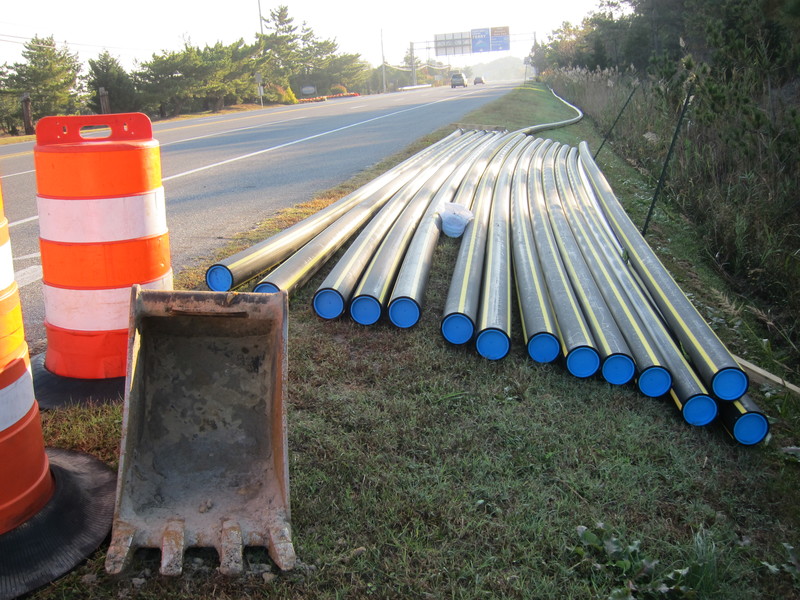Natural gas lines are now snaking their way into Lewes
Before this year is out, Chesapeake Utilities expects to have its new natural gas lines, feeding Beebe Medical Center and SPI Pharma, charged and ready to begin supplying fuel. Both enterprises expect to save a considerable amount of money by signing contracts with Chesapeake for the piped-in fuel.
Contractors continue the directional drilling process that is sinking the lines anywhere from 30 to 36 inches below ground level. No open trenches are being dug. Rather, Chesapeake does extensive surveys to determine where the drilling machine can go underground, and come back up out of the ground, without running into problems. Coming east along Route 9 from Harbeson, the gas line - according to Vice President Jeff Tietbohl - went south under the shoulder of southbound Route 1 before crossing under the highway just north of Lewes Auto Mall and then along Clay Road before reaching Kings Highway. The line is following Kings Highway and Freeman Highway to Monroe Avenue in Lewes. From there, one section of the pipe will continue along Freeman Highway, cross under the Lewes-Rehoboth Canal - again with the directional drilling machine - and then along Cape Henlopen Drive to its connection with SPI Pharma at the entrance to Cape Henlopen State Park. SPI Pharma, formerly Barcroft, manufactures a number of chemical constituents, mined from sea water, that are used in antacids and other products.
Mike Tappan, site controller for SPI Pharma, said the natural gas will save the company a significant amount of money and eliminate the traffic of at least 45 trucks which currently bring proane to the facility. The gas fires boilers which produce steam for heating and cleaning the facility. It also fuels a dryer used to create a powder from the constituents SPI draws from seawater.
At Monroe Avenue, a branch of the gas line will be placed beneath Monroe and Beebe avenues to make its connection with Beebe Medical Center. Eventually, Chesapeake expects to provide natural gas to residents and businesses in Lewes.
Chesapeake gets the natural gas it is selling from a pipeline owned by Eastern Shore Natural Gas Company that starts up in Pennsylvania and extends down the spine of the Delmarva Peninsula to Cape Charles. “That gas is pulled from a grid that’s connected to major interstate pipelines across the country,” said Tietbohl. He said those pipelines get their natural gas from fields in the Gulf of Mexico, Texas, Louisiana and as far west as the Rocky Mountains. “There are no natural gas storage sites on the Delmarva Peninsula.”
Natural gas is different from propane, which is a more highly refined form of natural gas. Propane is distributed via closed tanks on rail cars and trucks. In addition, Delaware’s Public Service Commission regulates natural gas distribution but not propane. “Because we are granted franchises to provide natural gas to certain areas, and because of the extensive infrastructure required to pipe in natural gas, we’ve been determined to be a monopoly-like situation,” said Tietbohl. “Public service commissions regulate our policies and procedures as a surrogate for competition.”
Dave Bonar works for Delaware’s Public Service Commission as a liaison with the Legislature and other agencies involved in regulation. He said state legislatures determine whether or not a commodity is regulated. The reason why natural gas is regulated and propane is not, he said, has to do with ownership of the companies involved. “Propane distributors are privately owned companies. Natural gas, on the other hand, is a publicly traded commodity owned by investors.”
Bonar said the Public Service Commission, which regulates everything from telecommunications to electricity to basic cable TV service, is heavily involved in setting prices for commodities such as natural gas. “We audit their books, review proposed expenditures, and make sure they’re maintaining reliability and keeping their customers satisfied. When we look at pricing, we consider the cost of capital, personnel costs and commodity costs. Utility regulation is more complex and detailed than many people understand. We have to give equal weight to the stockholders to make a profit and consumers to get fairly priced utilities.”
Mike Williams, a spokesman for Delaware’s Department of Transportation, said utilities such as Chesapeake have to get permits to install pipelines in highway rights-of-way, but there is no charge for use of that public land. “Utilities are typically placed within rights-of-way. For example, telephone poles. They’re in the pubic right-of-way, not on private land. And they’re usually placed on the edge of the right-of-way, so you can see where the right-of-way ends and private land begins.”
There is an area where the unregulated propane begins to step into the realm of the regulated natural gas. Bonar said there have been rumblings from people living in developments where a system of propane pipelines was installed to distribute the gas from centrally located tanks provided, maintained and administered by a single propane firm. Is that getting into the realm of a monopoly because people have no choice of who provides their propane and are obligated to pay whatever price the owners of the pipes and tanks deem to charge?
It’s a question that’s been raised, and with that, Bonar made one final statement. “If anyone wanted to regulate propane, it would take an act of the Legislature.”





















































